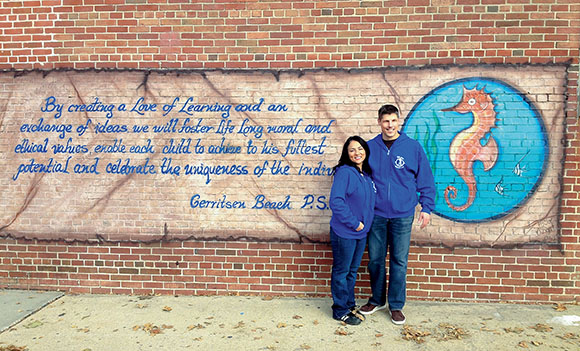 |
 |
| current issue |  |
past issues |  |
send a letter/news |  |
address update |  |
advertise |  |
about us |  |
alumni home |

|
Reaching Out stories
Truckloads
Dan Somma '94 and his wife, Soley, made multiple trips with supplies to New York, organized through Facebook and their church.
By Crystal Ward Kent '78
|
Dan Somma '94 and his wife, Soley, reached Far Rockaway, N.Y., just as the sun was setting. Great columns of dust from the storm debris swirled in the car's headlights. As far as they could see, a long line of ambulances, fire trucks, utility trucks and dump trucks were heading out of Far Rockaway. Their car was one of only four vehicles driving in. "There was no power, so everything was dark; the only lights were headlights," recalls Soley. "One lane of traffic could come in, and only one lane went out. At first, we wondered why everyone was leaving, then we realized—there was a curfew at nightfall. The area was completely unsafe after dark due to looting, and we still had to deliver our supplies." Thankfully, they came upon a church where the minister had not yet locked the doors. They unloaded and headed home, shaken by what they had seen. "You have no idea how bad the devastation is until you see it firsthand," says Soley. "The enormity of the need almost overwhelms you, but you realize, you can do something and had better get started." When the twin towers came crashing down on Sept. 11, 2001, Dan and Soley were deeply affected. Both have strong ties to New York City, and were frustrated by their inability to help during that crisis. So when Hurricane Sandy roared ashore last October, devastating a region they loved, they were determined to take action, even though they now live in Silver Springs, Md., where Dan is stationed with the Coast Guard. Their efforts started with Soley creating a Facebook page and seeking donations. "My goal was to fill my car with food and toiletries and drive down there," she says. "But within 24 hours, the house and yard were overflowing with items. The response was unbelievable. We had to set up a storage unit and eventually rented a truck to transport everything. " With the truck loaded, the Sommas set off for Far Rockaway, a poor, largely African-American neighborhood on Rockaway Peninsula in Queens that had been especially hard hit by Sandy. This trip would be the first of many. As of December, Soley and Dan had organized six more drives to Far Rockaway and other needy communities. Thanks to connections made on Facebook, and through organizations such as Occupy Sandy, they have geared their supply outreach to specific needs as the recovery process has evolved. Word of their efforts has spread even wider, with donations coming in from as far away as Vermont and Georgia. Initial trips brought baby supplies, diapers, food and toiletries, while subsequent trips have delivered winter clothes, tools and building supplies, toys, and school supplies. "People don't initially grasp how continuous the need is," says Dan. "It is not like when someone loses a home in a fire and helpers can go around the corner and quickly buy what the family needs. In these areas, whole neighborhoods are gone. Stores are gone. People are having to start over from the ground up yet there is nowhere to buy anything. Virtually everything has to be trucked in." Perhaps most heartbreaking has been the impact on children. In other disasters, schools have been a safe haven for children—a place to go that seemed "normal" even if homes were lost or lives changed. But on Rockaway Peninsula, 41 schools were closed and students were dispersed all over the city. Some families saw their children bussed miles away, often with each child in a different school. Adding to the chaos, schools that survived the storm could not cope with the huge influx of students. "We were getting pleas from teachers for essentials like paper, pencils," says Soley, tearing up. "They had nothing to teach with. I ached for these teachers and these families." Rebuilding efforts are taking place, but the damage extends far beyond that done by wind and waves. "It is the mold," says Soley, who has also volunteered with the home rebuilding effort. "It is everywhere. Even if a home is structurally safe, the mold has rendered everything inside useless. The homes have to be gutted and families cannot reclaim their possessions." Because the rebuilding of communities like Far Rockaway will be a long process, Dan and Soley have pledged to be involved for the duration. "The paperwork for insurance and government aid will take months, if not longer," says Dan. "In the meantime, these people need our help. They are paying for motels and trying to feed their kids while they wait for their living situation to get sorted out. If we can make things easier by helping provide essentials and aiding them in getting back on their feet, we'll do so. "Seeing the recovery efforts firsthand opens your eyes," says Soley. "Here in the United States, we have tremendous resources that can be mobilized, but there are still huge gaps when it comes to helping people in need. This is where average people can play a role. We can collect supplies, swing hammers, haul out debris and start getting things done. I've seen how much can be accomplished by regular people all working together and it is amazing." ~ Additional stories: Parishes and schools help Hurricane Sandy victims St. Andrew Apostle Catholic Church Collects Sandy Relief Supplies Sandy donations pour into Wheaton home Return to Reaching Out stories |
blog comments powered by Disqus

